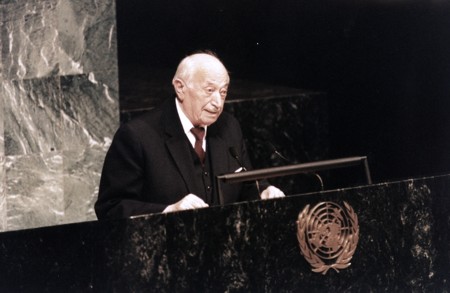|
Reviews of Recent Independent, Foreign, & Documentary Films in Theaters and DVD/Home Video
Directed by: Richard Trank. Written & Produced by: Richard Trank and Rabbi Marvin Hier. Edited by: Inbal B.Lessner. Director of Photography: Jeffrey Victor. Music by: Lee Holdridge. Released by: Luminous Velocity Releasing. Language: English, Yiddish & German with English subtitles. Country of Origin: USA. 105 minutes. Not Rated. Narrated by: Nicole Kidman. This straightforward biography of Nazi hunter Simon Wiesenthal was co-written and co-produced by Rabbi Marvin Hier, the founder of the advocacy and educational center named in Wiesenthal’s honor, and weaves together the investigator’s many television and public appearances, continually illustrated with gruesome images of his and others’ experiences in the Holocaust. Wiesenthal and his wife being sent to separate labor camps is poignantly recalled, as well as his recounting of his mother’s sacrifices and her being rounded up for the death trains. He secretly documented through drawings the horrors he witnessed at many concentration camps from the Ukraine to Mauthausen. After liberation, the first war criminal investigators frustrated him as inadequate. He then set up his own small dedicated office in Vienna. (Miraculously, he reunited with his wife after the war.) While Wiesenthal’s “Most Wanted” list of Nazis involved in the Final Solution is frequently lauded, his criteria are not made clear, and only anecdotal mention is made of his spy-like methodology that capitalized on anonymous sources. More and more he seems to have focused on cases that would bring maximum publicity, particularly when his fame grew after the capture of Adolf Eichmann, though his version of the matter is a bit different than others in the German television documentary Verdict on Auschwitz: The Frankfurt Auschwitz Trial 1963-1965. The film emphasizes the work of the Los Angeles-based Simon Wiesenthal Center in orchestrating graphic advocacy campaigns to help lobby various governments for the continuance of prosecutions. It also highlights how Wiesenthal bolstered those efforts by finding the Gestapo official who arrested Anne Frank, which countered those who doubted the diary’s authenticity, and a sadistic female SS guard living quietly in Queens. In addition to briefly including his championship of all Holocaust victims, including gays and the Romany, an interesting counterpart is Wiesenthal’s steadfast refusal to protest against former United Nations Secretary General Kurt Waldheim. He insisted that the evidence didn’t justify condemnation, though it’s a bit confusing if that included the information that was revealed many years after Waldheim left the UN.
In Austria, the toll taken on him and his family against protests by neo-Nazis or others who just wanted to forget is vividly portrayed (his office
filed threats into the “meshuggeneh box”), as well as the gradual appreciation for his passion by the younger generation. However, the documentation
of the honors paid to him near the end of his life gets a bit bogged down in celebrity gazing, as if Nicole Kidman’s narration over an incessant
musical score wasn’t proof of that already.
Nora Lee Mandel
|

